The Sustainability Accounting Standards Board has released a set of provisional sustainability accounting standards for “resource transformation” industries such as aerospace and chemicals.
The
SASB is a nonprofit organization that has no official standard-setting role, but it has the backing of prominent board members such as former New York City Mayor Michael Bloomberg, former SEC chair Mary Schapiro, and former FASB chairman Robert Herz.
The provisional standards, like all SASB standards, are supposed to help corporations comply with existing regulation, Regulation S-K, to disclose material information in the Form 10-K, but are totally voluntary. SASB has previously issued sustainability accounting standards for other industries including the financial sector, health care, technology and communications, transportation, nonrenewable resources, and service industries (see
The latest set of provisional standards for the “resource transformation” sector provide examples of disclosure topics such as hazardous waste management, product safety, fuel economy and emissions in use-phase, and materials sourcing. The standards average seven topics per industry, and 83 percent of metrics are quantitative.
“The resource transformation sector is responsible for manufacturing at a massive scale—everything from the planes we ride in to the packages we ship items in,” said SASB CEO Dr. Jean Rogers in a statement. “Population growth has led to greater demand of these products, and in turn, more carbon emissions, overstressed water sources and depleted natural resources. In order to remain competitive, companies in this sector must address these challenges.”
SASB draws from industry participants in drafting its standards. The working groups for Resource Transformation industries included
“SASB’s work to develop accounting standards for specific sustainability metrics is key to helping organizations determine what is material to their businesses and report on these metrics in a consistent manner,” said FMC Corporation corporate controller Nick Pfeiffer. “It is also important to get people involved across organizations from areas such finance, internal audit, legal, and government affairs in addition to members of sustainability teams so everyone understands why reporting on non-financial metrics is tied to future business success.”
SASB standards remain provisional for at least one year after the issuance date. To provide feedback on them, visit





